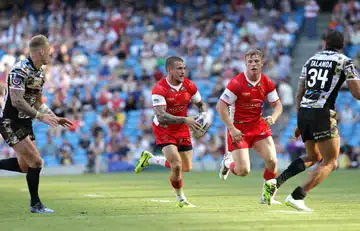Editor’s Verdict: Magic Weekend becomes a new tradition

After eight years, the Magic Weekend has surely now cemented itself as a mainstay of the rugby league calendar.
It was branded a gimmick upon its introduction back in 2007, another stick of innovation to beat the RFL with when it went wrong. But for something to become a tradition, it needs time.
Starting at the Millennium Stadium in Cardiff, it’s been to Murrayfield in Edinburgh, back to Cardiff and has now spent the last three years at the Etihad Stadium, home of Manchester City.
There’s no doubting that Saturday at the Etihad was the greatest day in the Magic Weekend’s short history. Four tight games were played out in front of a record crowd for a day at the event, in blistering weather conditions.
You would expect Manchester to put its hand up again to stage next year’s event, with the Magic Weekend forming a prominent part of the re-structure plans. It is likely to be joined by a second Magic Weekend, which could be held at Blackpool’s Bloomfield Road, for the 12 Championship clubs.
I’ve always had doubts over the integrity of the Magic Weekend, when it comes to the sporting competition of Super League, given it’s an extra fixture which can give an imbalance to the fixture list. Catalan landed the supposed easy draw of London, although were given a real test by Super League’s basement boys, and those two points could well make a difference when it comes to the play-off places at the end of the year.
The selection of the games over the weekend is always going to pose a dilemma. I’ve seen suggestions that a draw should be made the week before the event, but the problem you have there is some fans only want to attend on the day that their team is playing.
Another suggestion is to host the quarter finals or even the last 16 of the Challenge Cup at one stadium over a day or a weekend, or even a nines event, although the latter is unlikely to have the impact a regular round of Super League has.
But either way, it seems that the RFL and the clubs have decided that, despite the possible integrity issue, that the Magic Weekend will remain as a stand-alone round of league fixtures.
Whether it gains the sport any more coverage than usual is hard to gauge. But in terms of bringing fans together to watch top class sport under one roof, there’s nothing like it.
Rugby league fans now truly have a weekend that they can be proud of, and one that can stand alongside the Challenge Cup final and the Super League Grand Final as a key date in the calendar.
Envious of classy Cas?
High-flying Castleford set the tone for Sunday’s rather unfortunate trio of relatively one-sided results, thumping Wakefield 50-12. Both the Tigers and Widnes, who defeated Salford on Saturday, continue to punch above their weight towards the top echelons of the Super League table, which sets up what will be an interesting game between the two at the Mend-a-Hose Jungle on Sunday.
Their progress this season is no doubt the least Dr Marwan Koukash was expecting of Salford following his significant, and well publicised, investment in the re-branded Reds. Instead, he’s seen one of his own players, in Marc Sneyd, be pivotal in Castleford’s rise up the table, while Salford have now been beaten three times by Widnes this season, including twice during Iestyn Harris’ increasingly disappointing start to his reign which has yielded just one victory in seven.
It’s left the Reds in 11th place, with nine points from 13 games, although such has been the competitive nature of Super League this season, they are just three points off a play-off spot, so don’t write off a turnaround.
Video referee nonsense
The video referee process on Sky Sports is becoming increasingly unprofessional and cringeworthy. Sure, they’ve got the fancy technology that enables the likes of Gary Neville and Jamie Carragher to analyse football, a version of which is now regularly used by Brian Carney et al, but it’s not suitable to have referees controlling to make serious decisions in the game.
The TV audience get to see two bumbling blokes trying to figure out the technology, and you then get to see largely disjointed replays as they struggle to get to grips with replaying the action and slowing it down.
Whatever was wrong with how the video referee has always traditionally operated?
And don’t get me started on the “decision time” nonsense.